Theater’s Woke Circular Firing Squad
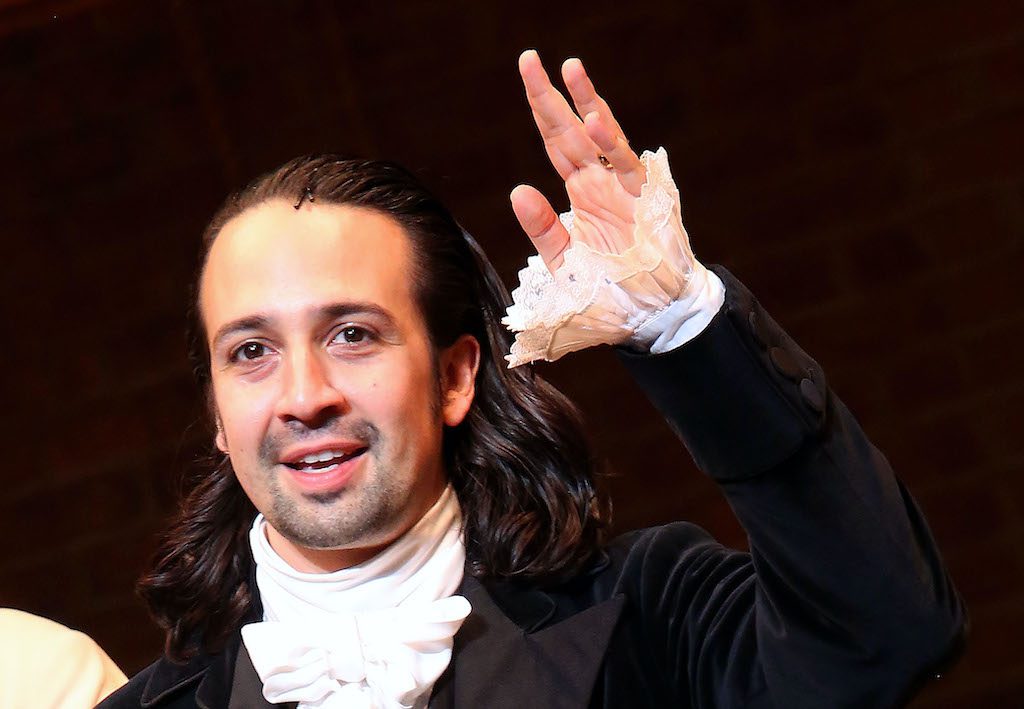
A reader sent me a link to a pretty great podcast by Bret Weinstein and Heather Heying. At some point in it, they bring up a new movement by BIPOC (pronounced “bye-pock”) theater makers, challenging white people in theater. They have written an open letter, called We See You, White American Theater. Here it is:

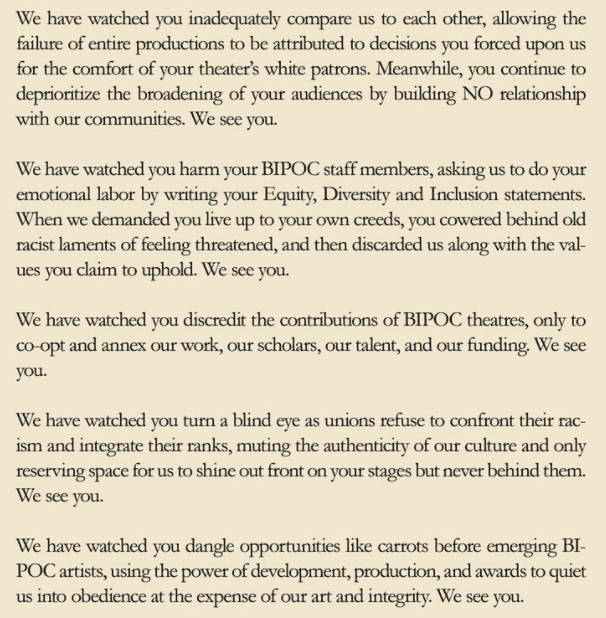
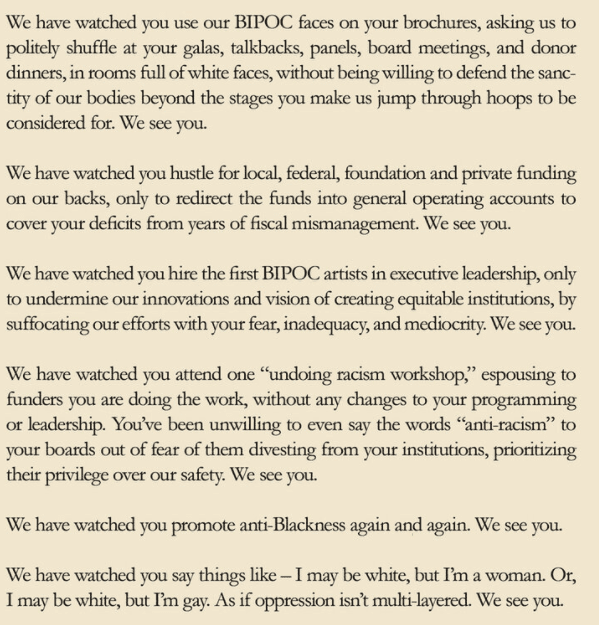

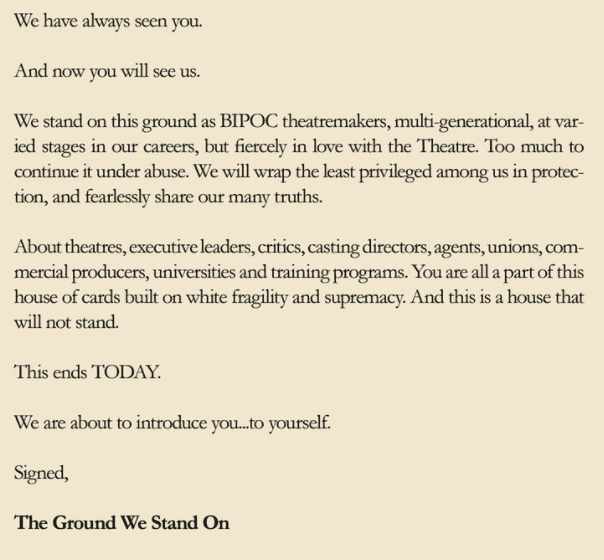
Go to their website here, if you like.This is not a minor thing. Some very big names in American theater have signed on, including Lin-Manuel Miranda and Suzan-Lori Parks. The petition has 60,000 signatures.
Weinstein and Heying also point to a three-night “Town Hall For Racial Reckoning” that the Atlanta theatrical community is staging (the last one is July 1). Check out the “rules of engagement”. You can only speak if you are BIPOC (black, indigenous, person of color). More:
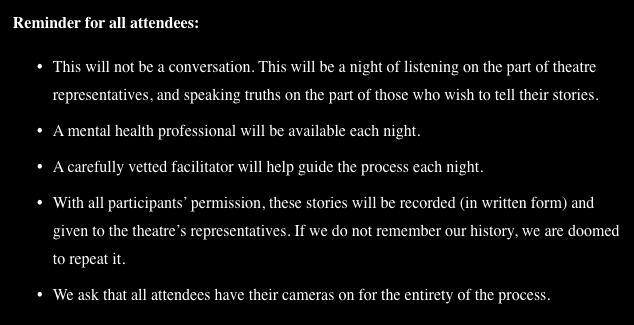
Golly.
I am not a theater person. I have no idea how legitimate the bill of complaints are against White American Theater, whatever that is. I would not have thought that the theater was a hotbed of race hatred, but maybe it is.
Looking from the outside, though, that WSYWAT (pron. “wizzy-wat,” because I say so) letter is incredibly provocative, a list of harsh accusations. Are they true? I don’t know how a White-Theater-American would even start to defend himself from them. They are not intended to invite dialogue of any sort. Likewise, it sounds like the racial reckoning townhall is meant for White-Theater-Americans to sit there silently while they are subjected to a Maoist struggle session.
What good can come out of this? Again, I don’t know the theater world, but if people really do have racial grievances, of course they should be voiced, and the community should work them out. That does not seem to be what is intended here, though. At all.
The timing is bizarre, too. The other day, all 41 Broadway theaters announced that they would remain dark for the rest of 2020, because of Covid-19. Everybody else is in the same sinking boat. In May, the Atlantic ran a piece speculating that the theatrical business may not survive this pandemic. It’s about the British theater, but the same lessons apply here. The piece points out that not only will the long shutdown kill some theatrical companies and venues, but those that survive will be so weakened that when they return, they will almost certainly have to stage sure-fire audience-pleasing productions at first (in other words, good luck trying to mount an eat-your-broccoli-bigot play). There will be a lot of unemployed actors and other theater professionals, and it may take years to rebound.
And into this unprecedented crisis — virtually an existential crisis — these BIPOC activists are staging a highly antagonistic racial drama against an industry that is one of the most progressive in the world? A drama that is going to heighten anger, mistrust, and discord, at a time when theatrical community needs to be pulling together? I don’t get it. It seems suicidal to me, but again, I’m not a theater person. If you are, help me understand the rationale here.
UPDATE: Black wokeness recently killed a Chicago theater. From the Chicago Tribune:
Comedy is dying in Chicago. A few weeks ago, five members of the iO improv theater started a petition titled, “I Will Not Perform at iO Until the Following Demands Are Met.” The petition, in addition to the demands, accused owner and co-founder Charna Halpern of having a history of racism and called on her to step down. Last week it was reported that the iO theater, having already been closed for two months due to the mandatory lockdown, will be closing permanently. The petitioners no doubt contributed to the financial stress of the theater, and are now reaping the consequences of their shortsighted activism.
The petition, with more than 2,500 signatures, demanded the hiring of a diversity and inclusion coordinator, a rewriting of the entire improv curriculum and increased funding of the theater’s current diversity program. These, at a time when the theater hasn’t been open for more than three months, are insurmountable demands.
I spoke with Halpern, the sole proprietor of iO, who explained her theater’s financial realities: She has a $40,000 per month mortgage, an $80,000 payroll every two weeks, a $250,000 yearly property tax bill, and an $18,000 workers’ compensation bill. And when the theater can’t make payroll, she frequently dips into her own retirement funds to cover it. “People think if you own a theater, you’re rich,” she put it bluntly.
To be clear, Halpern isn’t opposed to the petitioners, and if the theater were operating at full capacity, she’d be sitting down and meeting with them. “Right now,” she said, “there’s an important movement and they have a lot to fight for.” But these demands come at the worst possible time to actually accomplish anything. As one iO improviser told me, “It seems self-sabotaging to try and demand answers from someone that you can’t even set up a meeting with. That’s why it feels more like an attack than a protest.”
UPDATE: A commenter:
So true. I am an actor and occasional theatre producer in Chicago – a very active theatre town. My work has been nominated for and received Jeff Awards, Chicago’s version of the Tony’s. So, I guess I have suitable cred to comment. About 5 years ago, I decided to “step out of the parade” since I never knew when I would “step in it” with someone – especially younger artists. Table Work became a minefield and rehearsals less free because I had to think too much about what I was going to say.
I came up in a theatre culture that existed on the fringes, performing in bars, basements, and moving to storefronts. It was exciting because every production and tiny company seemed held together with tape, paint and grit. The work was raw, sometimes great, often bad. Very bad. Artistic Directors from the big reps would get out to see this work to catch a whiff of the zeitgeist. In production, nobody seemed to care much about where you came from, what you looked like or who you slept with. Live and let live. We were all misfits.
The desire of the BIPOC artists to be recognized by the “White Theatre” is curious. It confers an artistic authority on these institutions that is in reality quite tenuous. The big non profit Reps are the most vulnerable to these demands since they rely on foundations, government grants and big donors, often with agendas, to keep the doors open. (Theaters average only 40% of revenues from ticket sales.). The small companies get the crumbs. – if anything – but still produce some incredible work on shoestring budgets.
So, the “establishment” Theatre will go even more WOKE. BIPOC artists will get the recognition they want from these institutions. But the pathbreaking new work will be born, as it always has, in the storefronts, breathed into life by the misfits – who will one day mercilessly and ruthlessly satirize this woke emerging culture. The little companies will be called “anti social” or worse, and will not care, because they are artists.
Subscribe for as little as $5/mo to start commenting on Rod’s blog.